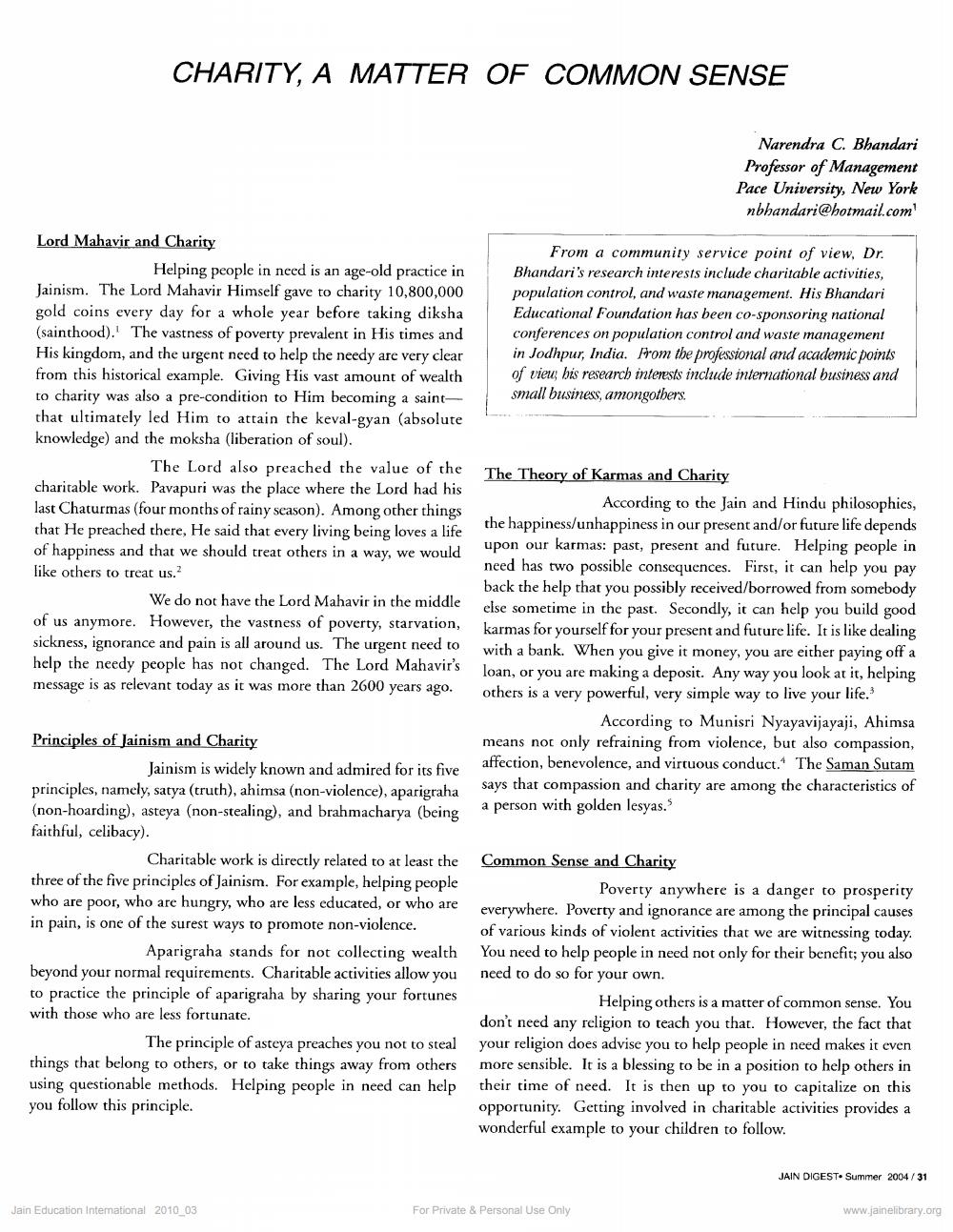________________
CHARITY, A MATTER OF COMMON SENSE
Narendra C. Bhandari Professor of Management Pace University, New York
[email protected]!
From a community service point of view, Dr. Bhandari's research interests include charitable activities, population control, and waste management. His Bhandari Educational Foundation has been co-sponsoring national conferences on population control and waste management in Jodhpur, India. From the professional and academic points of view, his research interests include international business and small business, amongothers.
Lord Mahavir and Charity
Helping people in need is an age-old practice in Jainism. The Lord Mahavir Himself gave to charity 10,800,000 gold coins every day for a whole year before taking diksha (sainthood).' The vastness of poverty prevalent in His times and His kingdom, and the urgent need to help the needy are very clear from this historical example. Giving His vast amount of wealth to charity was also a pre-condition to Him becoming a saintthat ultimately led Him to attain the keval-gyan (absolute knowledge) and the moksha (liberation of soul).
The Lord also preached the value of the charitable work. Pavapuri was the place where the Lord had his last Chaturmas (four months of rainy season). Among other things that He preached there. He said that every living being loves a life of happiness and that we should treat others in a way, we would like others to treat us.?
We do not have the Lord Mahavir in the middle of us anymore. However, the vastness of poverty, starvation, sickness, ignorance and pain is all around us. The urgent need to help the needy people has not changed. The Lord Mahavir's
virs message is as relevant today as it was more than 2600 years ago.
The Theory of Karmas and Charity
According to the Jain and Hindu philosophies, the happiness/unhappiness in our present and/or future life depends upon our karmas: past, present and future. Helping people in need has two possible consequences. First, it can help you pay back the help that you possibly received/borrowed from somebody else sometime in the past. Secondly, it can help you build good karmas for yourself for your present and future life. It is like dealing with a bank. When you give it money, you are either paying off a loan, or you are making a deposit. Any way you look at it, helping loan others is a very powerful, very simple way to live your life.
According to Munisri Nyayavijayaji, Ahimsa means not only refraining from violence, but also compassion, affection, benevolence, and virtuous conduct. The Saman Sutam says that compassion and charity are among the characteristics of a person with golden lesyas.
Principles of Jainism and Charity
Jainism is widely known and admired for its five principles, namely, satya (truth), ahimsa (non-violence), aparigraha (non-hoarding), asteya (non-stealing), and brahmacharya (being faithful, celibacy).
Charitable work is directly related to at least the three of the five principles of Jainism. For example, helping people who are poor, who are hungry, who are less educated, or who are in pain, is one of the surest ways to promote non-violence.
Aparigraha stands for not collecting wealth beyond your normal requirements. Charitable activities allow you to practice the principle of aparigraha by sharing your fortunes with those who are less fortunate.
The principle of asteya preaches you not to steal things that belong to others, or to take things away from others using questionable methods. Helping people in need can help you follow this principle.
Common Sense and Charity
Poverty anywhere is a danger to prosperity everywhere. Poverty and ignorance are among the principal causes of various kinds of violent activities that we are witnessing today. You need to help people in need not only for their benefit; you also need to do so for your own.
Helping others is a matter of common sense. You don't need any religion to teach you that. However, the fact that your religion does advise you to help people in need makes it even more sensible. It is a blessing to be in a position to help others in their time of need. It is then up to you to capitalize on this opportunity. Getting involved in charitable activities provides a wonderful example to your children to follow.
JAIN DIGEST. Summer 2004 / 31
Jain Education International 2010_03
For Private & Personal Use Only
www.jainelibrary.org
